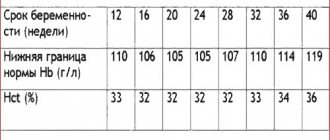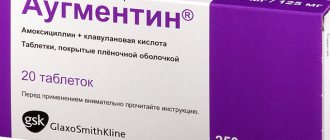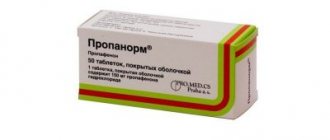06/01/2018 Category: Medicines and vitamins Author: Olga Petrova
The health of the expectant mother is one of the most important factors in the favorable course of pregnancy. A lack of vitamins and beneficial micro- and macroelements is very dangerous during pregnancy. Folic acid is vital during this time. We will talk about the features of this vitamin and its intake in an “interesting” position in this article.
- Indications, contraindications and side effects
- Can there be an overdose?
- Features of application
At what stages of pregnancy can you take folic acid?
- Photo gallery: analogues of the drug Folic acid
Importance of folic acid
Vitamin B9 deficiency is also associated with disruptions in the digestive tract. This means taking antibiotics, which kills beneficial microflora. Intestinal diseases impair the ability to absorb acid, and therefore interfere with its entry into the blood. If before pregnancy a woman can feel normal with insufficient amounts of folacin, the daily norm should be regularly supplied after conception. With a balanced diet, as well as taking folic acid, it is possible to prevent deviations in the development of the neural tube that occur in the first weeks after fertilization.
Many women try, only after learning about their special situation, to refuse to take any medications. Synthesized vitamin B9, in complex or in separate form, is absorbed much better than natural analogues. In addition, sufficient concentration allows a pregnant woman to avoid toxicosis, drowsiness, dizziness, nausea and surges in blood pressure in the first semester.
The dosage of folic acid during pregnancy is from 400 to 600 mcg, which is equal to one tablet. This is the most optimal form for absorption by the body.
Folic acid during pregnancy for women
Doctors add folic acid and vitamins during pregnancy to their list of recommendations for two reasons. Firstly, we need to support the female body, which is under great stress on all organs and systems. Secondly, minimize the risks of abnormal fetal development.
Interesting to know! Initially, folate was prescribed only if women were at risk of developing iron deficiency anemia in the first trimester of pregnancy. Later, a relationship was noticed between developmental defects in infants and B9 deficiency. After this, folic acid was prescribed to absolutely everyone. It is not toxic to adults and children, even if there is a short-term dose overdose.
Why do you need folic acid during early pregnancy?
This is one of the most important substances for the fetus. In the first two weeks after conception, the neural tube is already formed, which later, through cell division, gives rise to the formation of the spinal cord and brain. To prevent serious pathologies in the development of the central nervous system, doctors recommend starting to take B9 at the planning stage. This helps reduce the risk of deformities such as cleft palate, cleft lip, and mental retardation.
In addition, children who received enough B9 during intrauterine development suffer less from neuroses and have a stable psyche. In general, a developing fetus needs folic acid for normal cell division and the formation of organs and tissues. This substance is especially important for epithelial tissue, nervous and plasma. Therefore, they take folacin preparations all trimesters. Folates are important when carrying a child as they participate in the formation of the placenta and support its functioning. These substances can also protect a woman from premature birth.
Folic acid during pregnancy. Photo: kaznews.kz
Mechanism of action
After fertilization, a special zygote cell is formed. It contains genetic material, and the development of an embryo requires doubling of the DNA helix. It is in this process that such an important acid takes an active part. During cell division, separate layers are formed, one of which will later become the brain. This happens in the early stages, up to 4 weeks, so the expectant mother may not even realize what violent processes are beginning in her body.
In order for pregnancy to proceed normally, constant renewal of the cells of the mother’s body is required. Thanks to vitamin B9, the circulatory system works smoothly, and its protective functions protect against pathogenic factors. The mother’s good health and stable emotional state are also the merit of folacin, but mood swings and increased nervousness may indicate an insufficient amount of it.
Folic acid is prescribed to prevent neural tube pathologies. Its formation occurs in the first weeks after implantation of the egg into the uterine cavity. The woman does not yet feel any changes, without measuring her basal temperature and testing for hCG, she will remain in the dark for some time.
If there is a significant deficiency of vitamin B9, this can lead to the development of embryo pathologies:
- absence of a brain;
- hydrocephalus;
- cerebral hernias;
- spina bifida.
The concentration also affects the condition of the placenta. The likelihood of its detachment, fetal death, and miscarriage increases. To prevent such deviations, it is important to start taking the drug before conception.
Instructions for use
During pregnancy, you need to take folic acid, following all the necessary instructions. It is extremely undesirable to start taking it without a prescription from your doctor, since it will be difficult to choose the correct daily dosage and form of the vitamin. This may cause side effects.
Start of reception
In the early stages of pregnancy, folic acid is prescribed for the normal formation of all organs and systems of the unborn child, the placenta. The neural tube begins to form at 2-3 weeks of the embryonic period, which is 5-6 obstetric weeks. It is at this time that the active development of all organs of the unborn child occurs, and therefore folic acid during this period is especially important to prevent the development of negative consequences.
The placenta is formed at 7-9 obstetric weeks. This period is quite dangerous, since it is at this time that the corpus luteum ceases to function, and hCG begins to be synthesized by the placenta. If it is not sufficiently formed, the pregnancy is terminated. Therefore, in the first trimester of pregnancy, folic acid is prescribed in higher dosages.
End of reception
When a woman is prescribed folic acid during pregnancy, the question arises of how much to take and when to stop taking it. The period of intrauterine development is the time of the fastest growth of the body, which requires a large amount of nutrients. Therefore, women are advised to continue taking folic acid not until a certain week of pregnancy, but before and after childbirth, in order to avoid negative consequences .
Dosages by trimester
The dose of folic acid during pregnancy depends on many factors:
- term;
- presence of toxicosis;
- number of fruits;
- woman's age;
- balanced diet;
- interval between pregnancies (if less than 2 years, an increased dosage is needed);
- disorders of the gastrointestinal tract;
- kidney pathologies;
- hypertension;
- a history of miscarriages or other pregnancy pathologies.
For pregnant women, the dose of folic acid:
- in the first trimester is from 800 to 1000 mcg
- in the second and third - from 600 to 800 mcg.
During lactation, the dosage ranges from 400 to 600 mcg. If a woman has had missed abortions or early miscarriages, the dosage in the first trimester can be increased to 5 mg.
For gastrointestinal disorders and other diseases, dosage calculations are carried out individually.
Overdose
If the dosage of folic acid is exceeded during pregnancy, taking several tablets a day instead of one, a woman may experience the following symptoms:
- metallic taste in the mouth;
- nausea;
- vomit;
- decreased appetite;
- bloating;
- stool disorders;
- increased excitability;
- difficulty falling asleep.
Also, with an excess, the level of cyanocobalamin decreases. An excess of folic acid can mask the symptoms of B12 deficiency, and therefore hypovitaminosis does not become noticeable immediately.
Side effect
When calculating how to take folic acid during pregnancy, you must definitely mention the side effects:
- allergic rash;
- stool disorders;
- flatulence;
- allergic rhinitis.
The above symptoms are rare (if the daily norms are observed) and occur with hypersensitivity to the vitamin. Also, side effects may occur if the dosage per day was chosen incorrectly and without a doctor’s prescription.
Vitamin B9 dosage
The daily human requirement is about 50 mcg. But when planning, as well as after pregnancy, the doses increase several times. It must be remembered that taking folic acid does not end at the stage of childbirth. The required amount of vitamin B9 for an expectant mother is 400 mcg per day. If a woman practices breastfeeding, then she should continue taking such an important acid; it increases to 600 mcg. This will allow the baby to grow up calm and healthy.
The dosage in tablets depends on the release drug:
- if folic acid is included in a multivitamin complex, its volume is from 300 mcg to 1 mcg, which meets the daily requirement of the pregnant woman;
- There are separate forms in which 1 tablet is equal to 1 mg, which is quite enough to replenish the daily requirement;
- For treatment, increased doses of up to 5 mg per day are used, therapy is carried out for no more than a month during the period of preparation for fertilization or after conception, in order to reduce the risks of pathologies of the neural tube that have already occurred, as well as to improve health indicators if women have hypovitaminosis or anemia;
- It is recommended that expectant fathers also take folic acid at the planning stage, the duration of the course is 3 months, the dosage is prescribed individually based on the medical history, with normal values it is about 200 mcg, of course, after pregnancy you can no longer take the drugs.
Proper nutrition is of great importance, especially during pregnancy. Vitamin B9 is found in liver, spinach, greens, and legumes. But heat treatment partially destroys useful elements. The best way to ensure your folacin requirement is to take pharmaceutical forms.
What is the benefit of folic acid for women after 40 and 50 years of age?
After 40 years, women experience hormonal age-related changes due to the attenuation of reproductive activity and changes in hormonal levels in the body. B9 smoothes out the symptoms of menopause, maintains youthful and elastic skin, prevents hair loss, and normalizes the functioning of the cardiovascular and nervous systems.
Folic acid is also useful for women over 50 years of age. It reduces the negative manifestations of menopause on a physical and mental background. The vitamin is involved in the production of red blood cells, which supply oxygen to all body tissues. The element has a positive effect on digestive processes, maintains normal acidity, normalizes the absorption of proteins and fats, and also promotes the digestion of food.
How to use
Folic acid is not toxic, so significant excess doses are not dangerous to health. With long-term use (more than 3 months), it can affect vitamin B12 levels and lead to its decrease. The drug is taken according to the instructions:
- The tablet is taken at approximately the same time, after meals, washed down with water;
- it is taken regularly, if one dose is missed, there is nothing wrong with it, you can resume it as soon as the opportunity arises;
- is best absorbed together with vitamins B 12 and C, and additional bifidobacteria promote the synthesis of folacin in the intestines;
- Aspirin, antacids, antiepileptic drugs, as well as alcohol, significantly reduce the concentration of acid in the blood.
A balanced diet along with taking a vitamin complex is the key to the health of the expectant mother and baby.
Source: ChudoMalysh.ru
Something like folic acid during pregnancy is prescribed to almost everyone, especially during pregnancy planning and its first trimester. Even ardent opponents of taking medications during pregnancy treat folic acid favorably. And this is true, since a lack of this vitamin in the expectant mother’s body (and folic acid is vitamin B9) is fraught with many serious unpleasant consequences. During pregnancy, a sufficient dosage of folic acid is extremely important, since B9 is involved in DNA synthesis, in the process of cell growth and division, and in the process of hematopoiesis. Folic acid is necessary during the development of the nervous system in the fetus; it prevents the development of defects in the neural tube, brain, etc.
____________________________
Content:
1. Folic acid during pregnancy: dosage
2. Folic acid during pregnancy: daily dose and body need
3. Dose in tablets and vitamin preparations
4. Overdose of folic acid during pregnancy
5. Folic acid in foods during pregnancy
Video
____________________________
Top
· folic acid during pregnancy: dosage
Doctors say that every second pregnant woman experiences a serious deficiency of vitamin B9 (folic acid). That is why it is important to prescribe and sufficient dosage of folic acid during pregnancy. Its deficiency is extremely dangerous both for the mother herself and for the unborn baby. Folate deficiency
provokes such serious violations as:
- formation of defects in the fetal nervous system (cerebral hernias, absence of the brain, hydrocele, spina bifida);
- development of cardiovascular system defects, “cleft lip” (cleft lip);
- disturbances in the process of placenta formation in a pregnant woman;
- increased risk of placental abruption, spontaneous abortion, miscarriage, premature birth, physical and mental retardation of fetal development and other health problems of the mother and child;
- anemia of pregnant women, and with severe deficiency of vitamin B9, megaloblastic anemia inevitably develops, which can be fatal for the pregnant woman and child.
At the same time, one should not rush from one extreme to another, although, unfortunately, many do just that: optimists do not believe in “medical horror stories,” and pessimists are ready to rush headlong to the pharmacy after the first paragraph of the article and swallow tons of drugs that can eliminate the deficiency folic acid during pregnancy. Both the first and second are wrong; everything needs a “golden mean”. In the vast majority of cases, the daily dose of folic acid during pregnancy needs to be supplemented with vitamin complexes for pregnant women. But a large dosage of folic acid during pregnancy is not always justified, and taking individual vitamin B9 preparations is not often prescribed. One way or another, during pregnancy it is best to listen to your doctors and not refuse to take folic acid. The main thing is that the dosage of folic acid is set correctly, taking into account the needs of the woman’s body at a particular moment.
Top
· folic acid during pregnancy: daily dose and body need
According to doctors, the requirement for vitamin B9 for an adult is 200 mcg per day (0.2 mg). Daily dose of folic acid
, providing the body's needs during pregnancy naturally increases. In this case, the minimum “daily dose” is 400 mcg per day (0.4 mg). In most cases, the dosage of folic acid during pregnancy reaches 800 mcg per day (0.8 mg). And when a pregnant woman is at risk (when vitamin B9 deficiency is proven as a result of research and tests), the daily dose of folic acid can increase to 5 mg per day.
How to understand pharmaceutical preparations of vitamin B9, is the daily dosage of folic acid sufficient in your case? First, listen to your doctor’s recommendations, insist that the dose of folic acid is prescribed based on test results, and not just for preventive purposes; if in doubt, consult another doctor. And secondly, always read the instructions carefully.
Top
· folic acid during pregnancy: dose in preparations
The most common are tablets containing 1000 mcg (1 mg) of folic acid. Often the recommended dosage of folic acid during pregnancy is one tablet of this drug per day. An overdose in this case is simply impossible.
In the case of a severe deficiency of vitamin B9 in the body of a woman carrying a baby, stronger “folic acid” tablets will most likely be prescribed during pregnancy: “ Folacin”
" or "
Apo-folic
". One tablet of these drugs contains 5000 mcg (5 mg) of folacin, and this is already a therapeutic dose of folic acid.
You should also take into account the intake of other vitamins and complexes for pregnant women, or rather their composition. Typically, all such drugs contain the required dose of folic acid. For example, in the preparation “ Folio
"contains 400 mcg of folacin and 200 mcg of iodine, the preparations "
Elevit
" and "
Materna
" contain 1000 mcg (1 mg), "
Multi-tabs
" - 400 mcg of folic acid, "
Pregnavit
" - 750 mcg, and vitamin tablets "
Vitrum prenatal
" contains 800 mcg of vitamin B9.
As a rule, if a pregnant woman is taking any of these medications, or another similar one, then supplemental folic acid is not required. Provided there is no deficiency of folacin in the body, of course. But, if folic acid tablets are prescribed during pregnancy in addition to vitamins, then the content of this vitamin in them must be taken into account so that the daily dosage of folic acid can be correctly calculated.
Top
· overdose of folic acid during pregnancy
And, of course, we cannot ignore the question: is it possible to overdose on folic acid during pregnancy and what is its danger for the baby and the expectant mother? We hasten to reassure you: folic acid is completely non-toxic to humans. An overdose of folic acid during pregnancy can only occur if you take a dose of the drug hundreds of times higher than required - this is approximately 25-30 tablets per day. Other excesses of the daily requirement, excess vitamins, are simply eliminated from the female body without any consequences. However, the dosage of folic acid during pregnancy should be adequate, that is, one that satisfies the body's need for it.
An excess of vitamin B9 is eliminated from the body on its own, but still, long-term use of high doses of folacin can pose a threat to both: the content of vitamin B12 in the blood decreases, which can lead to anemia in a pregnant woman, gastrointestinal disorders and changes in kidney function may occur , increased nervous excitability. This can happen if you take 10-15 mg of the drug daily for 3 months or longer. It is unlikely that any adequate woman will swallow 15 tablets in one day. Simply put, accidental overdose of folic acid during pregnancy is impossible.
Norwegian scientists conducted a scientific experiment, as a result of which the following fact was established: pregnant women who had an increased level of vitamin B9 in their blood plasma had children born one and a half times more likely to be prone to asthmatic diseases. But, unfortunately, scientists have not identified any specific doses that cause an excess or overdose of folic acid during pregnancy.
Therefore, if you are worried that the dosage you have been prescribed is too high, consult another doctor about this. But, as already mentioned, if the excess is slight, an overdose of folic acid during pregnancy is not dangerous.
Top
· Folic acid in foods during pregnancy
Well, for those who still firmly insist on a “drug-free” pregnancy, we can offer a set of products for the daily diet during pregnancy, containing a large amount of vitamin B9 in their composition:
- any vegetables with dark green leaves (green peas, lentils, beans, spinach, parsley, broccoli, asparagus, cabbage, green onions, carrots, beets, tomatoes, soybeans),
- some fruits (peaches, watermelon, melon),
- walnuts, sunflower seeds,
- bakery products made from wholemeal flour,
- buckwheat, oat and rice cereals,
- wheat germ,
- powdered milk, kefir, cheese, cottage cheese,
- egg yolk,
- beef liver,
- caviar.
It is no secret that a balanced, nutritious diet can compensate for the deficiency of any vitamins in the body. But if your doctor says you need to take extra doses of folic acid because you are deficient, don't argue. Filic acid does not accumulate in the body, it does not have this property, the excess is excreted, and the deficiency must be replenished with food and vitamins. Therefore, first get rid of the deficiency, and only then adhere to the “drug-free philosophy”. Well, and vice versa: let everyone around you repeat “you need to” - do not take ANY pills without consulting a doctor!
Health to you and your little ones in the belly!
Yana Lagidna, especially for MyMom.ru
Top
And a little more on the topic of pregnancy, folic acid per day, video:
Source: mymom.ru
Possible harm and contraindications
The dosage of folic acid during pregnancy under ideal conditions should be calculated individually, taking into account the characteristics of her body and diet. The vitamin has a number of contraindications for use:
- individual sensitivity to B9;
- bronchial asthma;
- cyanocobalamin deficiency;
- presence of malignant neoplasms in clinical or family history;
- chronic inflammation of the renal pelvis;
- anemia associated with B12 deficiency.
Cyanocobalamin can act as a folate antagonist, so exceeding folic acid levels during pregnancy can cause an imbalance of vitamins.
Individual sensitivity can manifest itself as a rash, deterioration in health, nausea, and vomiting. In such cases, the daily dosage of folic acid for pregnant women is reduced or the drug is replaced with a safer form.
Excess vitamin is excreted in the urine, but in cases of kidney dysfunction or liver failure, folate accumulation in the liver is observed. This may cause a decrease in immunity in the unborn child. Norwegian scientists have found that the use of high doses of acid can be harmful - it increases the likelihood of developing bronchial asthma in children.
General information about folic acid
This substance belongs to the B vitamins. In the body, folic acid, or vitamin B9 in other words, is produced in very small quantities, so most of it reaches a person with food. You can often find the term “folate” in some sources. Some people believe that folic acid and folate are the same thing. But it is not so. Folate is a natural form of the vitamin that occurs naturally in foods. And folic acid is a synthetic substance, that is, a product of chemical manipulations by scientists in laboratories.
Folates are found in the following foods:
- parsley;
- spinach;
- salad;
- cabbage;
- beet;
- cucumbers;
- broccoli;
- spinach;
- peas;
- beans;
- lentils;
- soy;
- oranges;
- bananas;
- apricots;
- wholemeal bread;
- meat;
- liver;
- eggs;
- leaves of black currant, raspberry, rose hips and some other products.
Dutch scientists have discovered a connection between folic acid and human mental abilities. In an experiment, it was proven that taking 0.4 mg of vitamin B9 daily preserves intelligence as you age.
When I was pregnant with my second son, I got a new local gynecologist. I was very surprised that she was against prescribing any synthetic vitamins unless absolutely necessary. To all my requests and questions regarding what I should drink from multivitamins, she answered that there is nothing better than a balanced diet. And only she treated folic acid differently and prescribed it in the first trimester of pregnancy.
Vitamin B9 is found in a fairly large number of foods: vegetables, legumes, meat products, etc.
Unfortunately, the diet of a modern person often does not correspond to the concept of “balanced nutrition”. Therefore, it is not uncommon for certain substances in the body to be lacking. In addition to this, vitamin B9 is practically unstable to environmental influences. It quickly breaks down during storage and cooking. There is also a category of people who lack the enzyme responsible for the absorption of folic acid. It is not absorbed from food at all, but taking pharmaceutical drugs can eliminate its deficiency. Normally, in a healthy person, folic acid in the blood should be in an amount from 7 to 45 nmol/l. And although these indicators are very small, their slightest fluctuations up or down are fraught with health problems. The main symptoms of folic acid deficiency are constant fatigue, loss of appetite, and severe irritability.
These signs are very similar to those experienced by a pregnant woman in the first months of pregnancy. Therefore, many people often have no idea about the lack of vitamin B9.
But if in normal conditions its lack is not so dangerous, then this problem becomes especially acute when a woman begins to carry a child under her heart. The body of the expectant mother at this time needs much more nutrients. And she needs especially a lot of vitamin B9, since it is involved in the process of DNA synthesis, growth and division of fetal cells, and the formation of the hematopoietic system. Folic acid is essential for the development of a child’s nervous system. Its deficiency often leads to defects in the brain, neural tube of the embryo, etc. All these organs are formed already in the first weeks of pregnancy. Thus, in the first week after conception, the formation of the fetal neural tube occurs, which is responsible for the correct functioning of the entire body. This is why obstetricians and gynecologists recommend starting to take folic acid 3-4 months before the final decision to conceive is made.
Preparations with “folk”, as expectant mothers affectionately call it, are freely available in pharmacies. They are produced in tablet form. Vitamin B9 can be contained either in single preparations with one active ingredient, or as part of a complex product, combined, for example, with iodine, iron, other B vitamins and other substances.
Vitamin complexes for pregnant women usually contain a whole range of substances necessary for pregnancy. Some may contain folate, a substance obtained from natural foods. And in others - folic acid, which was synthesized artificially. It is believed that folates are absorbed better and faster by the body.
Pharmaceutical factories produce folic acid in tablet form.
The single preparation contains only folic acid. Its name corresponds to the active substance. The auxiliary components are the following:
- lactose monohydrate (milk sugar);
- microcrystalline cellulose;
- povidone (polyvinylpyrrolidone);
- corn starch;
- magnesium stearate.
In the blood, vitamin B9 reaches its maximum value half an hour to an hour after administration. It accumulates in the liver and is excreted in the urine. Folic acid can penetrate to the fetus through the placenta and into breast milk.
Symptoms and causes of folic acid deficiency
The first signs of vitamin deficiency are lack of mood, appetite, nervousness and weakness, apathy and loss of interest in business. Breastfeeding mothers may experience increased postpartum depression. Hypovitaminosis leads to a deficiency of adrenaline, causing impotence and decreased performance. Nervous disorders cause aggression, irritability, fears, phobias, and insecurity.
Deficiency also provokes rapid fatigue, memory loss, decreased attention, and weight loss. According to doctors, the body does not retain B9 in sufficient quantities due to a diet that does not include foods such as various types of cabbage, legumes, citrus fruits, cherries, melon, soybeans, figs, and gooseberries. If you do not consume these foods, you may develop vitamin B9 deficiency.
One of the causes of deficiency is considered to be chronic alcoholism in women and intestinal disorders that impair the absorption of beneficial elements. Poor absorption of folic acid occurs due to long-term treatment with antibiotics and drug courses that impair absorption in the gastrointestinal tract.
With B9 deficiency, the following consequences are possible:
- Megaloblastic anemia (anemia) is a decrease in red blood cells and disruption of their normal functioning. The disease causes indigestion, constant fatigue, hair loss and painful mouth ulcers.
- Problems during pregnancy - early miscarriage, premature birth and placental abruption.
- Mood swings leading to depression.
- Infertility or fetal pathologies - mental retardation, hydrocephalus, circulatory system disorders, cleft lip.
- Cognitive impairment – insomnia, nervousness, aggressiveness, anxiety for no reason.
Symptoms of folic acid deficiency appear 10-30 days after the level of the vitamin in the blood decreases.
Indications, contraindications and side effects
Indications for the use of Folic acid are:
- prophylactic use during pregnancy and lactation in order to prevent its deficiency in the body;
- treatment and prevention of folate deficiency anemia.
The drug should not be taken by persons who have the following health problems:
- individual intolerance to the components of the drug;
- anemia associated with vitamin B12 deficiency;
- lactose intolerance;
- lactase deficiency;
- glucose-galactase malabsorption (impaired absorption of glucose and galactose).
Also, the drug should not be taken by children under 3 years of age. Folic acid should be taken with extreme caution:
- in the presence of a folate-dependent malignant tumor;
- when taking dihydrofolate reductase inhibitors (drugs that slow down the activity of this enzyme).
Side effects may include:
- allergic reactions: rash, itching, erythema (severe redness of the skin due to dilation of capillaries), bronchospasm (narrowing of the bronchi), hyperthermia (fever), anaphylactic reactions;
- from the gastrointestinal tract: anorexia, nausea, bloating, bitterness in the mouth, diarrhea;
- from the nervous system: irritability, sleep disturbance.
With long-term use, there is a risk of developing hypovitaminosis B12.
Folic acid is not compatible with all medications, so you must consult a doctor before taking it. Reduces the absorption of folic acid:
- antacids (drugs that reduce gastric acidity);
- Cholestyramine;
- antimicrobial agents from the sulfonamide class (Arifon, Klopamide and others).
Reduce its effectiveness:
- Methotrexate;
- Pyrimethamine;
- Triamterene;
- Trimethoprim.
The connection between the absorption of zinc and the simultaneous intake of folic acid has not been proven. However, some scientists suggest that their combined use does not allow zinc to be properly absorbed.
Contraindications to the use of folic acid
A direct contraindication for prescribing B9 is an allergy to all representatives of this group of vitamins. In case of renal failure and pyelonephritis, it is also not advisable for use. If a woman suffers from anemia, which develops due to B12 deficiency, folic acid is also unacceptable. The instructions for use of folic acid indicate possible adverse reactions from the use of the substance. If they exist, they speak of individual intolerance.
Can there be an overdose?
Previously, it was believed that an overdose from taking folic acid could not happen. However, recent research has proven that this is possible. Those pregnant women who took it for a very long time or in large quantities gave birth to children susceptible to frequent colds and bronchial asthma. The health of a pregnant woman with uncontrolled intake of folic acid is also at risk, since an overdose is often not noticed for a very long time. And it can lead to vitamin B12 deficiency, as well as disruption of the central nervous system and gastrointestinal tract.
This is why you should not start taking folic acid supplements on your own. It is important to remember that only a person with a medical education and knowledge of the patient’s health condition can prescribe the correct dosage and duration of use of such drugs.
The safest forms of the vitamin
Pregnant women are prescribed to drink folic acid to support the woman’s body and prevent developmental disorders in the baby. But if there are disturbances in the functioning of the gastrointestinal tract and kidneys in the mother’s body, the vitamin is not able to be broken down completely, which can be harmful. This can cause an increase in the likelihood of childhood autism, the formation of malignant neoplasms, and a deficiency of other vitamins.
Therefore, it is preferable for women with chronic diseases to take folic acid in the form of metabolites during pregnancy:
- methylfolate;
- folinic acid;
- 5-methyltetrahydrofolate.
These are the most common analogues. And if you choose which folic acid is better to choose during pregnancy, you should pay attention to analogues. They are absorbed faster and are less likely to cause side effects and overdoses.
Doctor's Best, Fully Active Folate 400 with Quatfolic, 400 mcg, 90 Veggie Caps
502 rub.
Buy More details iherb.com
Features of application
According to the World Health Organization, a pregnant woman should receive 0.4 mg of folic acid per day. But each case is individual. And, based on the condition of the expectant mother, the doctor may prescribe a different dosage. It is possible to take 0.8 mg of the drug, and for anemia even 5 mg. Only a doctor can calculate the correct dose. It is he who prescribes the drug dosage regimen.
Typically, a pregnant woman is prescribed to take 1 tablet per day with a concentration of the active substance of 1 mg. But the doctor can make an appointment in a different way. For example, 2-3 tablets of 0.4 mg per day. If the expectant mother has been confirmed to have folate deficiency anemia, then she is prescribed a dosage of more than 5 mg. Typically, this condition is treated with the drug Folacin, which is no longer a preventative, but a therapeutic agent.
When purchasing a vitamin at a pharmacy, you should definitely pay attention to the concentration of the active substance, which varies.
It is better to drink folic acid after meals, as it increases the acidity of gastric juice. And in pregnant women, taking it before meals can cause vomiting. If you take a vitamin B9 tablet with meals, digestion of food will be difficult.
Unfortunately, not all doctors indicate when prescribing the drug the amount of active substance that should be in 1 tablet. This happened to me too. The gynecologist prescribed taking 1 tablet of Folic acid twice a day. Arriving at the pharmacy, I was extremely discouraged by the fact that the dosage could be different. The lack of necessary information led to the fact that I had to visit the doctor again so that she could clarify the amount of folic acid in the daily dose.
For the treatment of folate deficiency anemia, the drug Folacin is prescribed.
At what stages of pregnancy can you take folic acid?
The importance of taking vitamin B9 at the stage when the baby’s life has not yet begun, and at the early stage of pregnancy, was mentioned above. But the need for this vitamin does not disappear even after.
Thus, its lack throughout the entire period of pregnancy can lead to preeclampsia (a complication of its course, characterized by high blood pressure, edema and the appearance of protein in the urine). This condition is very dangerous for the fetus, as blood flow through the placenta is disrupted, which often leads to a delay in the physical development of the child. This pathology can also lead to premature birth and eclampsia, in which blood pressure becomes critically high, which is dangerous for the life of the mother and fetus.
In the last 3 months of pregnancy, folic acid is an important element to prevent too early rupture of the amniotic membrane, as well as the onset of labor ahead of schedule.
Doctors usually prescribe folic acid supplementation in the first 3 months of pregnancy. Subsequently, as a rule, multivitamins are prescribed for pregnant women, which also contain it, but in a smaller dosage. In any case, the need to take any vitamins should be determined only by a doctor based on available data on the health status of the pregnant woman.
What folic acid to take during pregnancy
What folic acid to drink during pregnancy, what complexes to choose? If a married couple took the process of planning a baby seriously and both spouses took pure B9, then after successful conception it is taken in combination with other minerals and vitamins. Doctors recommend choosing complexes created for pregnant women, in which folacin is in the optimal dosage.
Advice! It is important that these complexes contain iron and ascorbic acid, which helps the absorption of folic acid.
If a woman took multivitamins for a long time before pregnancy, after conception and pregnancy she can limit herself to pure folic acid or dietary supplements additionally containing yeast.
Folic acid content in foods. Photo: izida-women.ru
Analogs
Among the complete analogues of the monomedicine Folic acid, the following can be distinguished:
- Vitrum folicum. One tablet contains 0.4 mg of active substance. Indications, route of administration and dosage correspond to the original drug.
- Folacin. Contains 5 mg of active ingredient in 1 tablet. It is a therapeutic agent for the elimination of folate deficiency anemia.
Complex preparations that contain other beneficial substances besides folic acid include:
- Foliber. Also contains vitamin B12. Among the contraindications are individual intolerance to the components of Foliber, lactose intolerance, lactase deficiency, glucose-galactase malabsorption. The dosage of folic acid in 1 tablet is 0.4 mg, and cyanocobalamin (vitamin B12) is 0.002 mg, which is the minimum daily dosage.
- Elevit pronatal. This drug is a combination of vitamins and minerals necessary for the health of a pregnant woman and her baby. It contains 0.8 mg of folic acid. Contraindications to taking this vitamin complex are individual intolerance to the components, an excess of one or more substances of the drug in the body, kidney and liver diseases, impaired absorption and excretion of iron, problems with excessive excretion of calcium in the urine.
- Alphabet Mom's health. The uniqueness of this vitamin complex lies in the fact that all the substances contained in it (namely 13 vitamins with folic acid together, 11 minerals and taurine) are distributed among three tablets in such a way that they do not interfere with the absorption of each other. Vitamin B9 is contained in two tablets of 0.3 mg each. Contraindications include sensitivity to the components of the drug, as well as hyperfunction of the thyroid gland. The manufacturer recommends taking each tablet separately throughout the day. But it is also possible to take all three tablets at the same time. But the effectiveness of taking the drug decreases.
- Folio. The drug contains folic acid in the amount of 0.4 mg and 0.2 mg of iodine in 1 tablet. Contraindications include individual intolerance to the components. Should be taken with caution by women with thyroid diseases.
In both my first and second pregnancies, I took regular Folic acid until the 12th week of pregnancy. The gynecologist did not prescribe me any further multivitamins for expectant mothers. In my opinion, with a nutritious, varied diet, the body does not require additional sources of vitamins and minerals, even when a woman is in an “interesting” position.
Photo gallery: analogues of the drug Folic acid
What foods contain folic acid?
Folacin was first synthesized from spinach leaves, hence the name of the substance. Until now, the main source of the vitamin is fresh ground greens: spinach, parsley, onions, arugula. There is a lot of it in green fruits and vegetables, red berries, but folic acid is better absorbed from animal products, but there is one caveat: during heat treatment, 75% of folates are destroyed.
- liver of birds and animals;
- eggs;
- legumes;
- buckwheat grain;
- dairy and fermented milk products;
- mushrooms;
- strawberries, bananas.
Table 1 - Folic acid content in foods. Photo: syh.gopemad.ru.net
These products are consumed every day to maintain normal folacin levels.
Lack of vitamin B9 in the body
An irrationally monotonous diet, long-term use of certain medications, alcohol abuse, genetic diseases and digestive problems are the main reasons that lead to hypovitaminosis B9. Typically, endogenous reserves of the vitamin last a person for 1 month. If negative factors continue to influence, then the clinical manifestation of deficiency begins.
In addition to fetal malformations and anemia, folic acid deficiency can lead to other negative consequences for the body.
- increased fatigue and depression;
- rapid heartbeat and shortness of breath;
- changes in skin color or graying of hair;
- the appearance of ulcerations on the mucous membranes;
- slower tissue regeneration, long-term non-healing wounds;
- diseases of the cardiovascular system, including stroke;
- cancer of the colon, breast, ovary, pancreas, lung, brain, cervix or prostate;
- age-related visual impairment.
Where can I buy
Folic acid for pregnant women is sold in pharmacies and online stores. Pharmaceutical compositions can be mono- and polycomponent. Monocomponent products have a high dosage and are made from synthetic raw materials. Therefore, taking synthetic folic acid often causes heartburn, allergies, nausea and vomiting in pregnant women.
Multicomponent supplements contain all the microelements necessary for the expectant mother. But such supplements do not take into account the individual characteristics of a pregnant woman’s body and her diet. Vitamins that are sold in pharmacies are made from artificial raw materials, and therefore during pregnancy, the use of folic acid in such products can cause nausea, changes in the composition of urine, insomnia, and problems with stool. Such complexes have a fairly high cost, and therefore their purchase may not be affordable for every expectant mother.
iherb.com offers a wide range of supplements with various dosages from leading manufacturers from the USA and Europe. The additives are of natural origin and are produced without the use of synthetic raw materials and GMOs. Also, purchasing through an online store has a number of additional advantages:
- lower cost (30-50% compared to pharmacy analogues) due to the absence of intermediaries;
- the ability to purchase original products directly from the manufacturer;
- convenient delivery by the method chosen by the buyer anywhere in the world;
- detailed reviews and ratings from customers, which you can read before purchasing directly on the website;
- competent support service that will help you get answers to your questions.
For readers of our magazine there is a special 10% discount on your first order using the promotional code AGK4375 or using a direct link. The discount can be combined with other promotions and special offers, and therefore makes it possible to save even more on medications containing folic acid for pregnant women.
Folic acid is an essential vitamin during pregnancy. It reduces the likelihood of early miscarriage and prevents the formation of malformations in the unborn child. It is useful for expectant mothers to take this vitamin both at the planning stage and throughout pregnancy.
Foods High in Vitamin B9
Foods rich in folic acid
A variety of diet allows you to satisfy the body's needs for an important element:
- dark greens, spinach, lettuce, mustard, the volume of a deep plate, will fill the daily need for vitamins;
- asparagus contains more than 65% B9 and other equally important components, steamed or stewed, retains all its beneficial properties;
- broccoli contains about 25% of the daily requirement, you need to eat it raw, you can put it in boiling water for a couple of minutes, it has a vegetable and a pronounced antioxidant effect, you need to pay attention to cauliflower, as well as Brussels sprouts;
- fruits, especially citrus fruits, contain up to 20% of the valuable vitamin, papaya is considered the record holder, it contains about 115 mcg of acid, you should include oranges, grapes, grapefruits, bananas, traditional berries - strawberries, raspberries in the menu;
- legumes - a small bowl of lentils, peas, beans can replenish the required amount;
- seeds and nuts, all types are useful, the method of serving does not matter, you can enjoy it as a separate dish, you can also enrich salads, meat, fish, dairy products;
- beets, boiled, baked or raw, contain about 130 mcg; their excellent detox functions help to quickly cleanse the body of toxins;
- orange vegetables - pumpkin and carrots contain about 8% per 100 g. By constantly adding bright vegetables to your diet, you can avoid vitamin B9 deficiency.
| Products 100g. | Content in micrograms |
| Sprouted wheat | 1250 |
| Chinese cabbage salad with paprika | 391 |
| Boiled beans | 330 |
| Beef liver | 260 |
| Leek | 220 |
| Strawberries (fresh) | 194 |
| Peas without pods | 170 |
| Leaf salad | 130 |
| Fresh cabbage salad with orange | 69 |
Folic acid is synthesized in the intestines due to the presence of healthy microflora. Without this condition, proper absorption of this vital vitamin is impossible.
When taking antibiotics, as well as treating dysbiosis, it is worth enriching your diet with high-quality fermented milk products. Natural yogurt, without additives or preservatives, biokefir, yogurt, fresh milk - quickly restore the situation. It is worth paying attention to preparations with bifidobacteria.
It is also necessary to monitor the heat treatment process. Under the influence of high temperatures, partial or complete destruction of the vitamin occurs. To preserve maximum benefits, you need to simmer, cook under a closed lid, for a short time.
The most valuable are fresh vegetables and herbs; you can also use preparations that will partially cover the required daily amount.
How to choose supplements
The selection of supplements is best done together with your doctor and after all the necessary tests have been carried out. Additives come in two types: monocomponent and multicomponent. Mono products contain only folic acid, without any other substances. They are more often used for healthy women who have a balanced diet.
Multicomponent products are used in the winter and spring, when it is quite difficult to provide the diet with sufficient nutrients. Also, when considering how much folic acid to drink during pregnancy, one cannot ignore the environmental situation, stress level, and general health. Therefore, women are more often prescribed multicomponent drugs that help comprehensively support the body.
Medicines based on metabolites are prescribed to women with metabolic disorders and autoimmune diseases. Such supplements are absorbed faster and are less likely to cause side effects.
Dosage B9
A dosage of 800 mcg per day is suitable for almost all women - it allows you to achieve the required folate level in 4 weeks.
Expectant fathers will also benefit from adding folic acid to their diet: every 100 mcg daily intake has been shown to reduce the proportion of abnormal sperm by approximately 3.6%.
However, there is no need to overdo it with vitamin B9 (see below - chapter on overdose).
When is the drug prescribed?
Many people do not know about the benefits of the medicine and do not understand why doctors prescribe it so often. Folic acid is recommended for all pregnant women in the first, second and third trimesters, as well as for those who are still planning to have a child. This is an essential substance and its sufficient quantity in the body is a determining factor in the process of formation of the fetal neural tube.
In addition, its benefits for the proper functioning of the placenta are noted. Women who take folic acid for a long time reduce the risk of premature birth or miscarriage. Vitamin B9 is involved in the formation of white blood cells and promotes normal iron absorption.
Lack of folic acid provokes the development of the following diseases in the unborn baby:
- hydrocephalus;
- delayed muscle and brain development;
- other pathologies and defects.
general characteristics
Vitamin B9 is known by a number of other names:
- folic acid;
- vitamin BC;
- vitamin M;
- pteroylglutamic acid;
- folinic acid.
In English the vitamin is called Folic Acid. Latin name: Acidum Folicum.
Acid derivatives are combined into one group called “folates”.
Solgar, Folic Acid, 400 mcg, 250 Tablets
694 rub.
Buy More details iherb.com
Folic acid belongs to the group of water-soluble B vitamins. It takes part in DNA synthesis and helps improve the functioning of the immune and circulatory systems. Vitamin B 9 helps prevent the development of megaloblastic anemia, and during pregnancy reduces the risk of developing neural tube defects in the fetus.
Partially produced by intestinal microflora. It also additionally enters the body through the consumption of green vegetables (parsley, spinach). It is excreted from the body with fluid, and therefore overdoses of the vitamin occur extremely rarely.
History of discovery
Lucy Wills
In the 30s of the twentieth century, scientist Lucy Wills discovered that taking yeast extract helps prevent the development of megaloblastic anemia in pregnant women. It was this study that helped in identifying the substance that was identified as the main active ingredient in yeast. Then vitamin B9 was called “Wills factor”.
In 1941, the substance was synthesized from spinach leaves, which is why it got its name “folic acid” from the Latin “folium” - leaf. In 1945, vitamin B9 was first synthesized artificially by scientist Yellapragada Subbarao.
What is the daily dose?
The normal level of folic acid in a healthy person is 200 micrograms. However, a woman must provide double the amount of the substance during pregnancy. Both when planning and when expecting a future baby, the dosage of folic acid should be from 0.8-0.9 mg to 3.5-4 mg per day. In the early stages, its amount is less than in later stages. The specific amount is prescribed by the doctor. It is necessary not to exceed the dosage, as this will harm the woman’s body and the fetus.
At what stage of pregnancy should you take folic acid supplements?
Taking folic acid to prevent fetal malformations should begin at the stage of preparation for pregnancy, at least three months before the expected conception. This is why pregnancy must be planned. If conception occurs unexpectedly, then you should start taking the drug as soon as it becomes known.
Reasons for taking folate during pregnancy planning:
- With an unbalanced diet, a woman may have a reduced level of folic acid, so it takes time to replenish its reserves. This usually takes three to four months.
- The neural tube of the embryo is formed at such an early stage that the woman may not yet be aware that pregnancy has occurred, especially with a long menstrual cycle.
- Folate deficiency can make it difficult to get pregnant.
What are the consequences?
Expectant mothers who are aware of the full degree of responsibility will never ignore the doctor’s orders and instructions. If vitamin B9 deficiency is not corrected, complicated consequences may develop, which can lead to delayed development of the fetus and more.
Possible complications:
- death of a baby inside the womb;
- placental abruption;
- gestosis of varying degrees;
- spontaneous abortion;
- premature delivery.
Important! Of course, you can independently study the instructions for the medication and take the vitamin in accordance with the information specified in it. But it is better to consult a doctor and follow his instructions.
Use of vitamin B9 in medicine
Folic acid has been used for a long time to treat blood diseases, in particular anemia. However, today the spectrum of therapeutic action of vitamin B9 has been somewhat expanded.
Indications for use of vitamin B9:
- Unbalanced diet and laboratory-established folic acid deficiency.
- Macrocytic hyperchromic anemia; anemia with leukopenia caused by drugs or ionizing radiation.
- Megaloblastic anemia.
- Post-resection anemia.
- Sideroblastic anemia in old age.
- Anemia associated with diseases of the small intestine, sprue and malabsorption syndrome.
- Treatment and prevention of anemia in pregnant and breastfeeding women.
- Prenatal prevention of the development of neural tube defects in the fetus.
- Long-term antitumor treatment with folic acid antagonists (methotrexate, sulfamethaxazole + trimethoprim) or long-term use of anticonvulsants: phenytoin, primidone, phenobarbital - the latter is part of the well-known drug Corvalol.
Vitamin B9 preparations:
- Folacin (30 tablets of 5 mg).
- 9 months Folic acid (30 tablets of 400 mcg).
- Folic acid of various pharmaceutical grades. manufacturers (50 tablets of 1 mg).
- Folio (150 tablets – folic acid 400 mcg + iodine 200 mcg).
- Mamifol (28 tablets of 400 mcg).
- Complivit trimester 1 (400 mcg), 2 (350 mcg) and 3 (260 mcg).
- Femibion I and II (200 mcg folic acid + 200 mcg metafolin).
- Elevit pronatal (folic acid 800 mcg).
- Elevit feeding (200 mcg folic acid).
- Solgar folate (metafolin 400 mcg, 50 tablets).
Folic acid preparations. Click on the image to enlarge it
How does the body get folic acid?
3 sources of folic acid:
- From food - in the form of folates
- A small amount of vitamin B9 is synthesized by the body itself (intestinal microflora) during the normal functioning of the gastrointestinal tract - in the form of 5-methyltetrahydrofolate
- Chemical folic acid - from vitamin supplements
Folates were first isolated from spinach leaves. Subsequently, it turned out that they are present in large quantities in almost all leafy vegetables. Other sources of folic acid include citrus fruits, green peas, bread, liver, nutritional yeast, cheeses, eggs and cottage cheese.
If there are so many foods containing folate, then why do you need to take folic acid tablets during pregnancy?
- Technological progress and market economics are forcing producers of plant and animal products to accelerate the growth of animals on the farm and the cultivation of greens and vegetables in the greenhouse, accordingly, less of the natural isomer of folic acid accumulates in products. As a result, reference information from old printed publications on the folate content in various products is currently not relevant and is overestimated.
- The main disadvantage of “natural” folates is their rapid destruction during heat treatment. Cooking, frying and stewing destroy almost 90% of the vitamin. But even eating raw foods does not guarantee the required amount enters the blood. Moreover, vitamin B9 is sensitive to storage conditions and shelf life: when boiling an egg, 50% of vitamin B9 is destroyed
- after 3 days the greens lose it up to 70%
- in meat after heat treatment - up to 95%
Therefore, about 60% of the population suffers from folate deficiency, and the body of a healthy pregnant woman receives a little more than 50% of the daily requirement of folic acid from food.
However, numerous studies by scientists have established that the body recognizes how folic acid enters the body and its absorption directly depends on this. Of course, intake from natural sources is better absorbed into the gastrointestinal tract even with metabolic disorders and gastric acidity and therefore has serious advantages over synthetic folic acid.
Folic acid synthesized by the body itself in the form of 5-methyltetrahydrofolate does not interact as strongly with other drugs and does not mask the hematological signs of vitamin B12 deficiency as synthetic folic acid. In addition, it eliminates the possible negative consequences of an excess of unreacted vitamin B9 in peripheral vessels.
But in order to provide a pregnant woman’s body with folates (and the need for them increases by 50 percent), you need to eat a huge amount of the above foods every day. In modern conditions this is impossible, and given the decrease in its quantity in modern products, it is ineffective. Modern folic acid preparations contain the required amount, are safe for pregnant women in the recommended dosage and have been studied quite well.
Impact on women's beauty and health
Indicators of beauty and health are interconnected. Vitality, sparkle in the eyes, velvety skin, shining curls - indicate the norm of all vitamins and minerals. Deficiency of important elements is expressed by various symptoms. Folic acid is responsible for the following factors:
- the main participant in the process of cell renewal - regeneration of skin, hair, nails;
- protein synthesis ensures the strength and elasticity of the hair shafts, and also prevents the fragility of the nail plates;
- the growth of curls, eyelashes and nails is activated.
The role of vitamin B9 (folic acid)
Folic acid is a water-soluble vitamin involved in fundamental processes in the body. For example, folic acid is involved in the regulation of the development of new cells and the synthesis of nucleic acids - DNA and RNA . Folates can be compared to a building material that modulates the entire genetic code - it synthesizes purine, cytosine, thymine and uracil.
Without folate, the cell simply cannot divide harmoniously and efficiently. With folate deficiency, the process of cell division is disrupted and intensively renewing or growing tissues - the mucous membranes of the gastrointestinal tract, bone marrow, skin and cells of the immune system - are primarily affected .
Use for disease prevention
- Reduces the risk factor for malignant tumors, in the early stages it is effective in neutralizing pathogenic cells that cause cervical and breast cancer.
- Rashes, ulcers, acne, increased activity of the sebaceous glands, as well as various forms of dermatitis, psoriasis are successfully treated with drugs in combination with folic acid.
- The intake of the female vitamin is mandatory not only during pregnancy, but also after, when, under the influence of unstable hormonal levels, deep postpartum depression occurs.
- Helps regulate the menstrual cycle, prevent PMS and pain.
What are the dangers of an excess of folic acid in the body?
Despite the fact that vitamin B9 is an essential substance for the body of every person, especially a pregnant woman, you need to take it with great attention and caution. An overdose of folic acid can cause unpleasant symptoms and diseases. Among the most common:
- bitterness in the mouth;
- a sharp decrease in appetite;
- discomfort in the gastrointestinal tract: bloating, diarrhea;
- unreasonable anxiety, worry;
- unstable psycho-emotional state;
- restless sleep or insomnia;
- provocation of vitamin B12 deficiency in the blood.
Overdose of the drug during pregnancy is rare. The body absorbs folic acid in the required amount. Its excess is partially removed by the liver, the rest leaves the body through the kidneys. In almost 100% of cases, taking folic acid is not accompanied by any side effects.
Excess vitamin B9 in the body
Folic acid hypervitaminosis is possible only in case of excessive use of medications. It is impossible to obtain a harmful dosage from food, since vitamin B9 is water-soluble and is easily excreted in the urine. Excessive concentrations of folate can cause nausea and vomiting, allergic reactions such as bronchospasm, erythema, fever or skin rash. Flatulence and abdominal discomfort may occur. On the part of the nervous system, insomnia and psychomotor agitation may be observed.
A dangerous condition is hidden intoxication with vitamin B9 . It develops in newborns whose mothers took excessive amounts of folic acid. These children experience visual impairment and slow mental development. They are more likely to suffer from bronchial asthma, eczema and obesity.
Which folic acid supplements are best to take?
400 mcg. 30 pcs. 120 rub. |
1000 mcg. 50 pcs. 40 rub. half a tablet a day |
1000 mcg. 50 pcs. 25-30 rub. (half a tablet) |
200 mcg. 90 caps. 110 rub. 2 tables each in a day |
400 mcg. 100 pieces. 500 rub. |
400 mcg. 100 pieces. 300 rub. |
1000 mcg. 50 pcs. 25-30 rub. (half a tablet per day) |
1000 mcg. 50 pcs. 30 rub. (half a tablet per day) |
Instructions for use of folic acidIndications: prevention of the development of neural tube defects in the fetus in the 1st trimester of pregnancy (1-3 months before the planned pregnancy and in the first trimester), as well as in case of folic acid deficiency. Contraindications:
Dosage: during pregnancy 400-800 mcg in the 1st trimester, with folic acid deficiency - 400 mcg once a day. Side effects: itching, skin rash, bronchospasm, hyperthermia, erythema, bitterness in the mouth, nausea, decreased appetite, bloating; with prolonged use, hypovitaminosis B12 may develop. Interaction with other drugs: taking anticonvulsants, analgesics, oral contraceptives, estrogens increase the need for folic acid. Sulfonamines, antacids, cholestyramine, reduce the absorption of vitamin B9. Pyrimethamine, methotrexate, triamterene, trimethoprim reduce the effect of folic acid (patients are not shown folic acid, but calcium folinate). When taking Folic acid simultaneously with tetracyclines, chloramphenicol, polymyxins, the absorption of folic acid is reduced. Special instructions: To prevent vitamin B9 deficiency, a balanced diet is preferable - green vegetables (tomatoes, carrots, lettuce, spinach), beets, legumes, fresh liver, cheese, cereals, eggs, nuts. Folic acid is not used for normocytic, B12-deficiency and aplastic anemia. In B12-deficiency (pernicious) anemia, vitamin B9 masks neurological complications, improving hematological parameters. Until B12 deficiency anemia has been ruled out, dosages of more than 100 mcg/day of folic acid are not recommended (except during pregnancy and lactation). With simultaneous treatment, antacids are taken 2 hours after folic acid, cholestyramine - 1 hour or 4-6 hours before taking folic acid. Antibiotics may distort the results of microbiological assessment of plasma red blood cell and folic acid concentrations. When taking large doses and long-term treatment with folic acid, the concentration of vitamin B12 may decrease. | |||
special instructions
To prevent folic acid deficiency, it is preferable to choose a balanced diet.
The following products contain a lot of it:
- greens (spinach, lettuce);
- tomatoes;
- carrots and beets;
- cereals and legumes;
- liver and eggs;
- nuts.
Vitamin B9 should not be taken to eliminate normocytic, aplastic anemia, or if it is caused by cyanocobalamin deficiency.
Since the administration of folic acid for B12-deficiency anemia, vitamin B9 improves hematological parameters, but at the same time masks neurological complications.
Before starting to take folic acid, B12-deficiency anemia must be excluded; before this, vitamin B9 should not be prescribed in a daily dosage of more than 0.1 mg (except for the period of pregnancy and breastfeeding).
It is worth remembering that patients on an artificial kidney machine require higher dosages of folic acid.
Taking vitamin B9 does not affect the ability to drive a car or engage in other potentially hazardous activities that require increased concentration.











